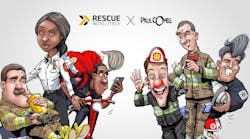A new century has dawned and at first light it has revealed itself to be a very dynamic one, especially for hazardous materials response. Many changes are on the horizon for hazmat programs and the way we respond to these emergencies. Some changes are good and some are bad. One fact is true though; our actions before, during, and after these impending changes demands our total and complete involvement. That is why our leadership is so important.
"When the sky is the darkest the brightest stars come out" is a statement that many of us have heard and may agree with. Leadership, and that of being a leader, can sometimes be a daunting challenge and a difficult role. It is definitely not a role for the faint-hearted; in fact it is commonly associated with being courageous, unnerving, and steadfast. In times that may seem the darkest often the true leaders emerge to assist in solving the problems at hand. It is also their leadership in those critical moments or periods of time in which they are remembered.
So how does a person go about developing their leadership skills? This column will take a look at leadership and its development with the goal of merely assisting in a direction for your own personal development and also to hopefully inspire you to chart your own course and achieve success.
To begin, it is important to realize that there is a huge amount of information pertaining to the subject of leadership. There are numerous books, magazine articles, and papers on this subject. The Internet and web also offer many "leads" on this topic. It is also important to recognize that many of these resources offer "theories" on leadership. We know that theories are "abstract thoughts or general principles of a subject that are offered to explain observable facts". Theories can also be described as merely a hypothesis or a guess. The point here is that there is no concrete definition or "set-in-stone" procedure to follow in developing a leadership style.
While one theory may work in a certain situation that same theory may fail in another situation. As a matter of fact, the U.S. Army requires that generals read a periodical by the name of The Military Review, which characterizes leadership as "one of the most observed and least understood phenomena on earth". Even our national defenders, who develop leaders, have a hard time with the concept of leadership. Still, realize that many ideas on leadership can be utilized and integrated into your own development. Maybe that is best; the development of your leadership style and your legacy will be unique to you. Like Frank Sinatra, you can claim you "did it your way"!
Developing Your Leadership Skills
Much of what we have learned about leadership has come from the examples that we have observed. This may be beneficial but most likely we have not had stellar examples in which to mold our own leadership styles, at least in the modern day view of leadership. Some long held views of leaders include John Wayne, Steve McQueen, or Clint Eastwood in silver screen depictions or real life leaders such as Winston Churchill, Franklin Roosevelt, or JFK. Modern leaders may include people such as, Bill Clinton, George Bush, or even Lee Iacocca, the savior of Chrysler Corporation. Iacocca once said, "Leadership means setting an example. When you find yourself in a position of leadership, people will follow your every move."
Iacocca's example was phenomenal in saving Chrysler in the early 1980's. As a leader, Iacocca recognized the tough decisions that needed to be made to save a company and thousands of jobs. Consider that he agreed to lead the company at half the salary in which he earned at Ford; he worked around the clock at a huge cost to his family; he fired 33 of his top 35 executives; he went to the Federal government and asked for a bailout to help save Chrysler; in 1980 he reduced his salary to $1; and he asked his executives to take a 10% salary cut. All of these tough actions resulted in the success of saving the Chrysler Corporation. In 1981 the company was showing a profit and in 1983 they repaid the Federal government loan completely. Now that's leadership!
Whatever your view of what a leader is remember there are many definitions and theories of leadership. A simple definition of leadership is a person who leads or directs others. Another definition of leadership is a person who has followers. Most likely, we would have very similar thoughts when it comes to defining leadership. Bill Bradley, an ex-Senator and pro basketball player, defines leadership as "getting people to think, believe, see, and do what they might not have without you." John Naisbitt, author of the book "Megatrends" says, "Leadership is finding a parade and jumping out in front of it." The common denominator in all of these views, and most likely yours, is that there has to be someone leading the charge, directing efforts, or coordinating the action.
We would probably also have similar thoughts when it comes to listing the traits of good leaders. In a poll of 2,000 managers in the United States from 1980-1984 the following list was developed on the characteristics of leaders.





